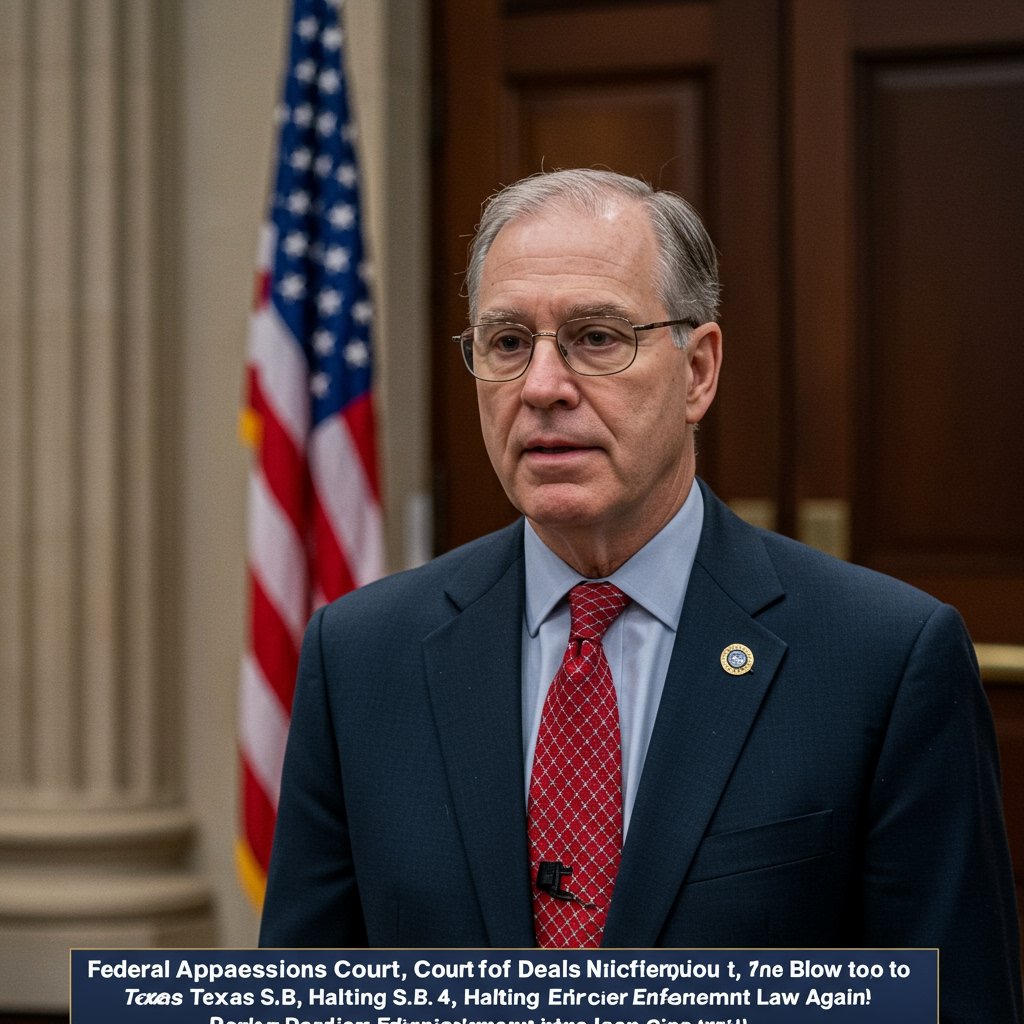Appeals Court Reinstates Block on Texas Border Law S.B. 4
In a significant legal development affecting border policy, the U.S. Fifth Circuit Court of Appeals on Thursday issued an order that temporarily halts the enforcement of Texas’s controversial immigration law, Senate Bill 4 (S.B. 4). This decision effectively reinstates a lower court’s injunction that had been briefly set aside by the U.S. Supreme Court earlier in the week, plunging the legal status of the law into further uncertainty. The ruling marks the latest turn in an intense legal and political battle between the state of Texas and the federal government over authority regarding immigration enforcement.
Understanding Texas S.B. 4
Signed into law by Texas Governor Greg Abbott in December 2023, S.B. 4 grants state law enforcement officers the authority to arrest individuals suspected of crossing the Texas-Mexico border unlawfully. The law also empowers state judges to order migrants to return to Mexico, irrespective of their nationality or potential asylum claims. Proponents of S.B. 4 argue it is a necessary measure for Texas to defend its border in the face of what they describe as insufficient federal action. They contend the state has a right to act to protect its territory and citizens, citing constitutional provisions related to invasion.
The Legal Challenge
The enactment of S.B. 4 was swiftly met with legal challenges from various parties, most notably the Biden administration and a coalition of civil rights organizations, including the American Civil Liberties Union (ACLU) and the Texas Civil Rights Project. These challengers argue that S.B. 4 is unconstitutional because it infringes upon the federal government’s exclusive authority over immigration matters. The U.S. Constitution and numerous Supreme Court precedents have established that immigration regulation is primarily a federal responsibility, a doctrine known as preemption. Critics of S.B. 4 assert that it creates a state-level immigration system that conflicts directly with federal law and international treaties, potentially leading to chaos and inconsistent enforcement.
The Legal Rollercoaster: District Court to Supreme Court and Back
The legal fight began in a federal district court in Texas, where the Biden administration and civil rights groups sought an injunction to block S.B. 4 from taking effect. In late February 2024, U.S. District Judge David Ezra sided with the plaintiffs, issuing a preliminary injunction that prevented the state from enforcing the law. Judge Ezra’s ruling largely rested on the argument that S.B. 4 is likely unconstitutional under the principle of federal preemption.
Texas appealed this decision to the U.S. Fifth Circuit Court of Appeals. While the appeal was pending, Texas asked the Supreme Court to allow the law to go into effect temporarily while the Fifth Circuit considered the case. For a brief period earlier in the week, the Supreme Court did issue an order that lifted the injunction, effectively clearing the way, momentarily, for S.B. 4 to be enforced. This decision, however, was procedural, granting Texas’s request to allow the law to take effect while the Fifth Circuit reviewed the underlying legal merits of the injunction itself. The Supreme Court’s order was immediately met with widespread criticism and concern from opponents of the law and immigration advocates.
The Fifth Circuit’s Latest Ruling
Following the Supreme Court’s action, the Fifth Circuit Court of Appeals promptly convened for oral arguments on the injunction itself. After hearing arguments from both sides, the three-judge panel of the Fifth Circuit on Thursday issued its order reinstating the preliminary injunction that blocks S.B. 4’s enforcement. The court stated clearly that the injunction will remain in place while the panel considers the full arguments on the merits of the case – specifically, whether the district court was correct in issuing the preliminary injunction based on its assessment of the law’s constitutionality.
This ruling means that, for now, Texas state law enforcement officers cannot use the authority granted by S.B. 4 to arrest and deport individuals based on their immigration status. The Fifth Circuit’s decision indicates that the panel believes the legal challenges to S.B. 4 have a significant likelihood of success on the merits, or that allowing the law to go into effect during the appeals process would cause irreparable harm that outweighs the state’s interest in immediate enforcement. The temporary nature of this ruling is crucial; it is not a final decision on the constitutionality of S.B. 4, but rather a decision on whether the law can be enforced while the complex legal challenges are fully litigated through the appeals process.
What Comes Next?
The Fifth Circuit’s decision sets the stage for a more thorough review of the preliminary injunction and the underlying legal arguments against S.B. 4. The appeals court panel will now consider the full briefings and arguments from Texas, the Biden administration, and the civil rights organizations. This process could take several weeks or months. Depending on the Fifth Circuit’s final ruling on the injunction, the case will likely continue its journey through the federal court system, potentially returning to the Supreme Court for a definitive ruling on the constitutionality of S.B. 4. The state of Texas has indicated its determination to defend the law, while the federal government and civil rights groups remain committed to blocking its implementation. The legal battle over S.B. 4 is far from over, and its outcome will have significant implications for state and federal authority over immigration and border security in the United States.






